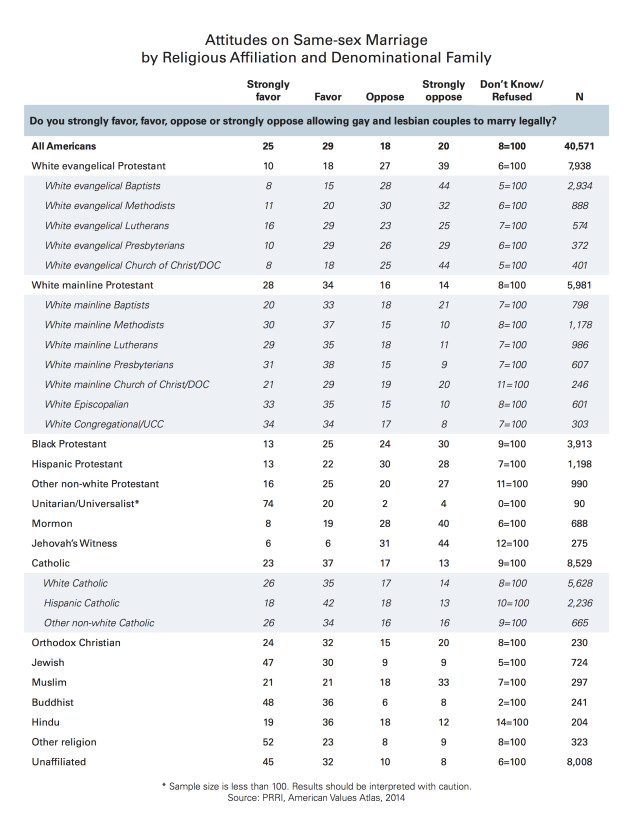From the beginning, religious divides have been central to the same-sex marriage debate. And as opinions have shifted in the general population, so have those of faithful. In 2003, when Massachusetts became the first state to legalize same-sex marriage, nearly two-thirds (65 percent) of religiously unaffiliated Americans supported same-sex marriage, but there were no major religious groups in which a majority favored allowing gay and lesbian couples to marry.
A decade ago, the most supportive religious groups were white mainline Protestants and Catholics, with 36 percent and 35 percent support, respectively. Today, major religious groups reside on both sides of this issue and within many key groups—such as Catholics—support among rank and file members is now at odds with official church opposition.
Findings from PRRI’s American Values Atlas, which draws on 40,000 interviews among a random sample of Americans, provides the most in-depth portrait to date of attitudes on same-sex marriage by religious affiliation.
The most supportive major religious groups are Buddhists (84 percent), Jews (77 percent), and Americans who select “Other religion” (75 percent); additionally, more than three-quarters (77 percent) of the religiously unaffiliated also support same-sex marriage.
More than six in ten (62 percent) white mainline Protestants support same-sex marriage. Among white mainline Protestant denominations, support ranges from 69 percent support among white mainline Presbyterians and 68 percent among both white Episcopalians and white Congregationalists/United Church of Christ members, to lower support among white mainline Baptists (53 percent) and white mainline Church of Christ/Disciples (50 percent).
And while the Catholic Church officially opposes the legalization of same-sex marriage, about six in ten white (61 percent), Hispanic (60 percent), and other non-white Catholics (60 percent) support allowing gay and lesbian couples to marry legally. A majority of orthodox Christians (56 percent) also support same-sex marriage.
On the other side of the debate, majorities of Jehovah’s Witnesses (75 percent), Mormons (68 percent), white evangelical Protestants (66 percent), Hispanic Protestants (58 percent), and black Protestants (54 percent) oppose allowing gay and lesbian couples to marry legally. Among white evangelical Protestant denominations, white evangelical Baptists are the most opposed (72 percent), while white evangelical Lutherans are nearly evenly divided (45 percent favor, 48 percent opposed).
As I recently noted in The Atlantic, even among religiously affiliated Americans, supporters today actually outnumber opponents. Among all religiously affiliated Americans, 47 percent favor allowing gay and lesbian couples to marry, compared to 45 percent who oppose. And support among all religious Americans has jumped nearly 20 percentage points, up from 28 percent in 2003.
The massive sample size of The American Values Atlas also makes possible a 50-state map of American opinions on same-sex marriage.
For more public opinion on same-sex marriage, see PRRI’s “Everything You Need to Know about Same-sex Marriage for the Upcoming SCOTUS Case.”





